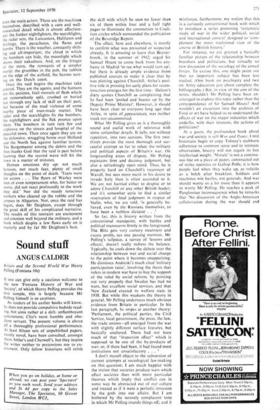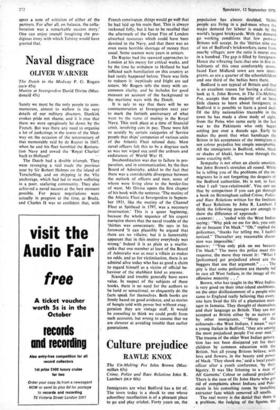Sound stuff
ANGUS CALDER Britain and the Second World War Henry Pelling (Fontana 10s)
If one can give only a cautious welcome to the new 'Fontana History of War and Society', of which Henry Pelting provides the first sample, this is largely because Mr Pelling himself is so cautious.
As readers of his earlier books will know, he does not provide compulsive bedside read- ing, but aims rather at a deft, unflamboyant conciseness; Clio's most humble and obe- dient servant. The present volume is above all a thoroughly professional performance. At least fifteen sets of unpublished papers, mostly novel, have been consulted, amongst them Attlee's and Cherwell's, but they inspire the writer neither to pretensions nor to ex- citement. Only fellow historians will relish
the skill with which he uses no fewer than six of them within four and a half tight pages to illuminate the commotion in Coali- tion circles which surrounded the publication of the Beveridge Report.
The effect, here and elsewhere, is mostly to confirm what was presumed or suspected already. It is amusing to learn that Beaver- brook, in the summer of 1942, urged Sir Samuel Hoare to come back from his em- bassy in Madrid `to see what would turn up', but there is already ample evidence from published sources to make it clear that he was plotting against Churchill. Attlee's posi- tive role in pressing for early plans for recon- struction emerges for the first time—Dalton's diary quotes Churchill as complaining that he had been 'jostled and beaten up by the Deputy Prime Minister'. However, it should have been clear to everyone long ago that Attlee, in spite of Appearances, was neither meek nor uncommitted.
What Mr Pelting gives us is a thoroughly sound and useful work of reference with some unfamiliar details. It falls, not without repetition, into two sections. The first two- thirds provide the most thorough and suc- cessful attempt so far to relate the military and political aspects of Britain's war. On longstanding areas of dispute, Mr Pelting maintains firm and decisive judgment, but also a refreshingly open mind. Thus, he is properly hard on Churchill's treatment of Wavell, but sees more merit in his desire to invade Italy than is often accorded to it. We are not harried either to despise or to adore Churchill or any other British leader; and it's somewhat eerie to find a similar reservation of final judgment in respect of Stalin, who, we are told, 'is generally be- lieved, even by the Russians themselves, to have been a ruthless dictator . .
So far, this is history written from the conventional standpoint, with battles and political manoeuvre firmly in the foreground. The Blitz gets very cursory treatment and excess profits tax one passing mention. Mr Pelling's tailpiece, a survey of 'lessons and effects', doesn't really redress the balance. Typically, he cools down the debate over the relationship between war and social change to the point where it becomes unappetising. He dismisses Andreski's much cited 'military participation ratio', involving the thesis that rulers in modem war have to buy the support of the ruled by social reform, by pointing out very properly that Sweden has had no wars, but excellent social services, and that New Zealand created its welfare state in 1938. But while this weakens the theory in general, Mr Pelting underrates much obvious evidence from Britain in particular. In his last paragraph, he snipes at another theory: `Parliament, the political parties, the Civil Service, local government, the press, the law, the trade unions—all emerged from the war with slightly different surface features, but basically unaltered. There had not been much of that "inspection effect" which is supposed to be one of the by-products of war; or, if there had been, it had found most institutions not unsatisfactory . . . '
I don't myself object to the subversion of current attempts at sociological law-making on this question; I am much happier with the truism that societies produce wars which affect societies than with more particular theories which imply that conflict can in some way be abstracted out of our culture and treated as if it were a periodic intrusion by the gods into our affairs. But I am bothered by the serenely complacent tone in which Mr Pelling rounds things off; and it reinforces, furthermore, my notion that this is a curiously conventional book with which to introduce a series promising 'systematic study of war in the wider political, social and international context' designed to 'com- plement the more traditional view of the course of British history.'
For instance, we are granted a basically familiar picture of the relationship between brasshats and politicians, but virtually no new discussion of the sociology of the armed forces. To excuse this, one might point out that no important subject has been less studied. (One book on psychiatry and two on Army education just about complete the bibliography.) But, in view of the aim of the series, shouldn't Mr Pelting have been en- couraged to explore this topic rather than the correspondence of Sir Samuel Hoare? And wouldn't an excursion into the archives of Ford or ici have helped us to understand the effects of war on the major industries which underlie, with their interests, the actions of politicians?
At a guess, the profoundest book about war and society is still War and Peace. Until historians begin to copy Tolstoy's stubborn adherence to common sense and to intimate observation, history will not regain its lost intellectual weight. 'Morale' is not a continu- ous line on a piece of paper, constructed out of strike statistics or Gallup Polls; it is how people feel when they wake up, as volatile as a belch after breakfast. Soldiers and machines win battles, not generals. And war should worry us a lot more than it appears to worry Mr Pelting. He reaches a peak of Panglossian inconsequence when he remarks that 'No discussion of the Anglo-American collaboration during the war should end upon a note of criticism of either of the partners. For after all, on balance, the colla- boration was a remarkable success story.' One can enjoy oneself imagining the pro- digious irony with which Tolstoy would have greeted that.















































 Previous page
Previous page